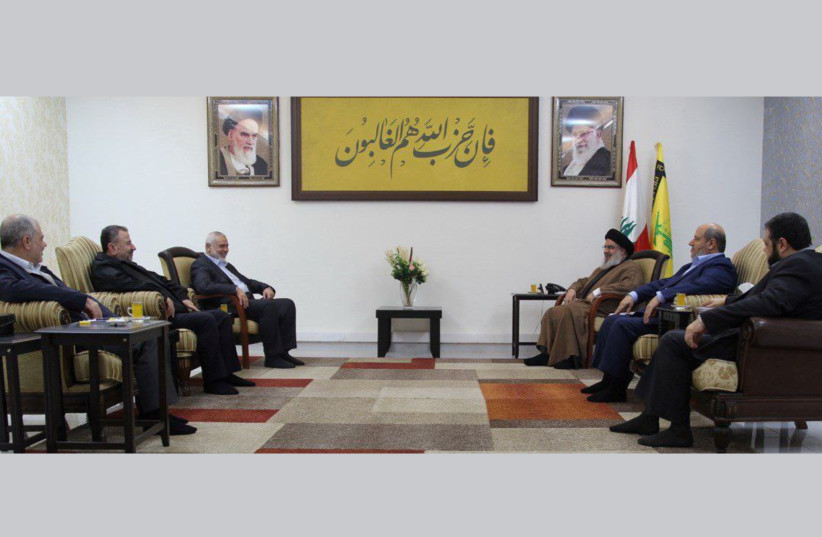Hamas yet to give up on the ‘unity of the battlefields’ against Israel
Thursday’s escalation along the border between Israel and Lebanon has revived Hamas’s hope of fulfilling its vision of the “unity of the battlefields,” which aims to trigger a multi-front confrontation with Israel.
Both Hamas and Hezbollah claimed responsibility for the firing of dozens of rockets at Israeli army bases and communities. Hamas is desperate to drag Hezbollah into the war.
Hezbollah, for its part, is seeking to send a message to Hamas that the Lebanon-based group has not abandoned its Palestinian allies and is ready to join the war.
According to the Hezbollah-affiliated Al-Akhbar newspaper, an operation room involving all members of the “axis of resistance,” including Hamas and Hezbollah, has been set up to coordinate military activities in the Gaza Strip and Lebanon.
The increased tensions in northern Israel came less than 48 hours after Hamas leaders expressed concern over the failure of Iran and its proxies, including Hezbollah, to join the fight against Israel. Despite the concern, Hamas has still not given up its hope that Hezbollah would ultimately join the war.

Unity of the Battlefields
In the past few years, Hamas and Palestinian Islamic Jihad have been promoting the idea of “wihdet al-sahat” (unity of the battlefields), which envisions other parties joining the fighting during another war with Israel. In addition to Hezbollah, these parties include Iran, the West Bank, east Jerusalem, Arab Israelis, the Yemen-based Houthis, and Syria.
In 2022, PIJ named its three-day military confrontation with Israel as the “Battle of the Unity of the Battlefields.” That confrontation erupted after Israeli security forces arrested Bassam al-Sa’adi, a senior PIJ activist from Jenin.
Yet the name PIJ chose for the confrontation did not match the reality on the ground as the group was left to fight alone while Hamas was sitting on the fence. Hamas also chose not to get involved in last May’s Israel-PIJ confrontation, which erupted after Israel killed three military commanders of PIJ.
Prior to the October 7 Hamas assault on Israel, leaders of the group seemed confident that the “axis of resistance” would immediately attack Israel once a war erupts in the Gaza Strip.
Judging from the statements of the Hamas leaders, they were also pinning high hopes on the “armed resistance” in the West Bank. The past two years have seen the emergence of a number of armed groups in the West Bank that are affiliated with Hamas and PIJ. These groups include the Jenin Battalion and the Lions’ Den. These leaders were also hoping that many Arab Israelis would take to the streets and engage in violent attacks against Israelis, as was the case in 2021.
The clashes that erupted along the Israel-Lebanon border over the past two weeks have been welcomed by Hamas as a sign that the “unity of the battlefields” is finally happening. However, some Hamas leaders did not conceal their disappointment over Hezbollah’s failure to launch a major attack on Israel.
Hamas officials Khaled Mashaal and Musa Abu Marzouk have been quoted as expressing disappointment with the failure of the “axis of resistance” to join the fight against Israel.
“The reaction of the axis of resistance to the event [the Israel-Hamas war] is disappointing,” said Abu Marzouk.
“The steps of Hezbollah, Iran, and Syria are insufficient,” complained Mashaal. “History is not made with timid and hesitant steps.”
This criticism has also been reflected in comments made by some Palestinians and Arabs who have been mocking Hamas for believing the belligerent statements, threats, and promises of Iranian and Hezbollah leaders. This criticism may also be behind Hezbollah’s increased involvement in the rocket attacks from Lebanon.
“[Syrian President Bashar] Assad, Iran, and Hezbollah have cracked our heads with lies,” remarked Nedal al-Amari, who describes himself as “an independent journalist working for the Syrian revolution.”
He added: “Why are they hiding like mice from Israeli airstrikes? Because they are busy bombing civilians in Idlib and its countryside. Most of Assad’s forces – Russia, Iran, and Hezbollah – are present in northern Syria to kill innocent civilians.”
Saudi petroleum engineer Dr. Mansour al-Malik also scoffed at the prospect that Iran and Hezbollah would come to Hamas’s rescue. “Iran sold Gaza, Hamas, [Palestinian] Islamic Jihad, and the resistance in return for the safety of the mullah’s regime,” al-Malik wrote.
Voicing concern that Israel would target Lebanon in retaliation for a Hezbollah attack, several Lebanese citizens have recently been warning that “the unity of Lebanon is more important than the ‘unity of the battlefields.’” Their message to Hezbollah: Lebanon doesn’t want to be dragged into the Israel-Hamas war.
A senior Palestinian Authority official in Ramallah, who requested anonymity, said Hamas leaders are beginning to realize that they have been left to confront Israel alone. The tensions along the Israel-Lebanon border have still not escalated into an all-out war, the Palestinians in the West Bank have not launched a new intifada, and most of the Arab Israelis are sitting on the fence, the official noted.
He cautioned, nonetheless, that the situation could change after an Israeli ground invasion of the Gaza Strip.
“A lot depends on what happens once the Israeli army enters the Gaza Strip,” the official said.





Comments are closed.